Hundreds of thousands stranded by India floods

Stranded by hundreds of miles of floodwaters and trapped on rooftops and trees, desperate villagers stormed rescue boats as they tried to escape the flooding that tore through a riverbank and spilled over northern India's vast plains.
Two weeks after the Kosi River overflowed its banks, Indian officials Sunday commandeered private watercraft after hearing that boat owners were charging people up to 6,000 rupees (£75) each for a lifesaving ride — an impossibly large amount for those marooned in impoverished villages where many live on less than a dollar a day.
At a makeshift command post on a bridge outside Triveniganj, near the Nepal border, boats filled with survivors arrived every 10 or 15 minutes. Anything rescuers could scrounge was put to work - bright orange rubber dinghies, rickety wooden rowboats, canoes and old-fashioned shallow-bottomed army transports.
Each time a boat docked, the crowd surged forward, hoping for news about loved ones. Many were outraged, saying the rescue operation was too slow and very little aid was reaching stranded villagers.
Angry cries turned to silence as a canoe came in with a shrouded body strapped on top. Perched next to the body were the dead woman's daughter and son-in-law.
"She died of starvation," said Sanjay Kumar, 55-year-old Surji Devi's son-in-law, as onlookers placed burning incense on the body.
"We were trying to survive on just water for the last 10 days, but it's not enough," said the woman's 27-year-old daughter, Asha.
About 1.2 million people have been homeless since the Kosi River in neighboring Nepal dramatically changed course two weeks ago, spilling billions of gallons of water into the plains of northern India's Bihar state.
Estimates of the number of dead range from scores to thousands. On Friday, 19 people drowned when their rescue boat capsized.
Some 700,000 people are still trapped with little or no food. The breach in the riverbank is more than a mile long and growing every day, and authorities say it cannot be repaired until the monsoon season tapers off in November.
In the flooded villages, hundreds of people scrambled to get on each rescue boat, wading through chest-high waters with suitcases on their heads.
Many wept and pleaded as they threw themselves on one boat designed to carry 12 people that eventually departed with 48 inside, according to an Associated Press photographer on board. Paramilitary officers forced off several others fearing the boat would sink.
Officials insisted they were doing their best to provide food and rescue.
"We have sent packets of rice and sugar to the stranded," said Ravindra Prasad Singh, a state government official coordinating rescue work in Supaul. The district lies about 875 miles (1,400 kilometers) east of the capital, New Delhi, and is one of five flooded districts in Bihar.
But he could not say how much had been sent and other officials acknowledged very little food was getting through.
Across Bihar authorities have evacuated 475,000 people, moving many of them in state-run relief camps, said Prataya Amrit, secretary of the state's disaster management department.
In northern Bangladesh, flooding has cut off at least 20,000 people, news reports said Sunday as a flood warning agency forecast the situation was "likely to deteriorate."
The monsoon season, which lasts from June to September, brings rain vital for the farmers of Bangladesh and India but also can cause massive destruction.
Join our commenting forum
Join thought-provoking conversations, follow other Independent readers and see their replies
Comments
Bookmark popover
Removed from bookmarks